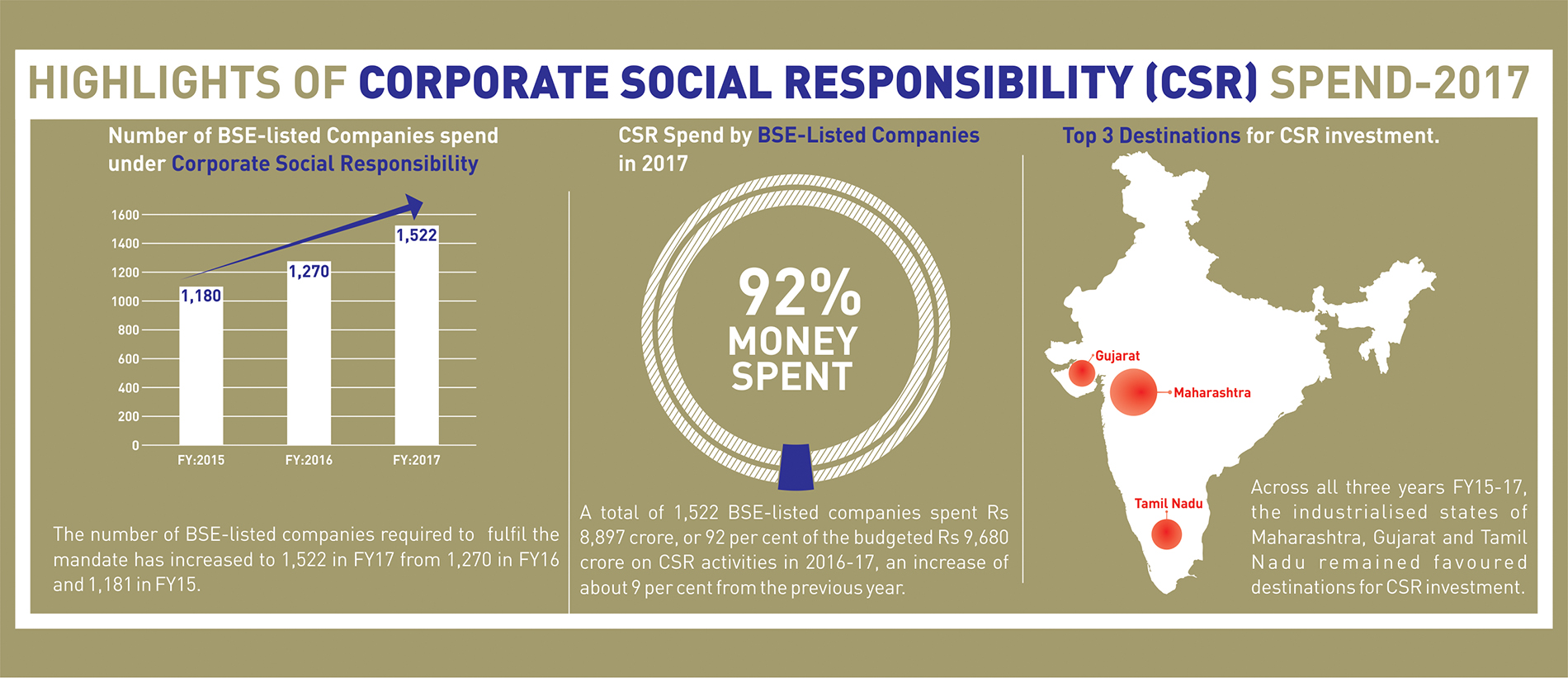With the growing Industrialization and competition, the main aim of any capitalist economy is to maximise its profit. But recently, the practice of CSR is gaining traction in both theory and practice. CSR in developing countries like India has played a significant role as the majority of the population living here is deprived of economic and social growth status. Such an idea of Social responsibility is also evolved in the modern corporates too. For the new generation of corporate leaders, profit optimization is more important than only profit maximization. Hence there is a shift in accountability from shareholders to stakeholders (including employees, consumers, and affected communities).
Today, CSR activity is on the agenda of many CEOs. It is also being considered seriously by the Governments (National and local), as well as NGOs, consumer groups, investors and other actors in civil society.
CSR Trends in India:-
According to CSR act 2013, “every company, private limited or public limited, which either has a net worth of Rs 500 crore or a turnover of Rs 1,000 crore or net profit of Rs 5 crore, needs to spend at least 2% of its average net profit for the immediately preceding three financial years on Corporate social responsibility activities. The CSR activities in India should not be undertaken in the normal course of business and must be with respect to any of the activities mentioned in Schedule VII of the act”. After the enforcement of new Companies Act,we can see a significant inflow of contributions by businesses towards socio-economic and environmental initiatives.Education ,healthcare,livelihood and skill development remain the areas receiving a majority of the CSR funds.
If a company engages with its stakeholders effectively, it can enjoy a strong and enduring reputation in the market and community. The idea still needs to be understood and implemented in a better manner by the business sector in India.
Here are a few factors influencing CSR in India.
CSR initiatives face many challenges in India and are often seen as a deterrent to even the best-intentioned plans. The most important ones are described here.
1.Lack of Community Participation in CSR Activities
Majorly, communities who are intended beneficiaries of a CSR program show less interest which will affect their participation and contribution. Also, very little efforts are being made to spread CSR within local communities and instill confidence in the people. The situation is further aggravated by inadequate communication between the organization and the community at the grassroots level.
2.Issues of transparency
Lack of transparency is one of the key issues. There is a perception that partner NGOs or local implementation agencies do not share adequate information and make efforts to disclose information on their programs, address concerns, assess impacts and utilize funds. This perceived lack of transparency has a negative impact on the process of trust building between companies and local communities, which is key to the success of any CSR initiative.
3.Lack of Consensus
There is a lack of consensus amongst local agencies regarding CSR project needs and priorities. This results in lack of consensus often result in duplication of activities by corporate houses in the areas of their intervention. The consequence results in unhealthy competitiveness spirit among local implementing agencies, which goes against the necessity to have rather than building collaborative approaches on important issues. This factor limits organization’s abilities to undertake an impact assessment of their initiatives from time to time.
4.Civil Society Strengthening
Capacity for strong performance in the community is the foundation for lasting social benefits. Worldwide, civil society is an important social and economic force with the potential to create a more free, fair and just global order. The collective nature of civic action helps to ensure that the interests of all citizens—including women, the poor and other marginalized groups—are adequately weighed by public institutions that make policy and allocate resources. Many civil society organizations (CSOs) face common challenges that limit their effectiveness namely, the ability to manage human and financial resources, weak advocacy abilities, and insufficient management ability to scale up promising innovations and results to achieve wider impact.
5.Social Impact Management
This addresses the issue of inclusive growth is more than mere poverty alleviation. It seeks to address the problem of equity through the enhancement of opportunities for everybody.

